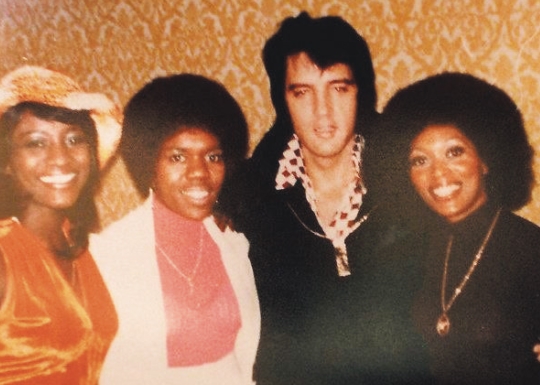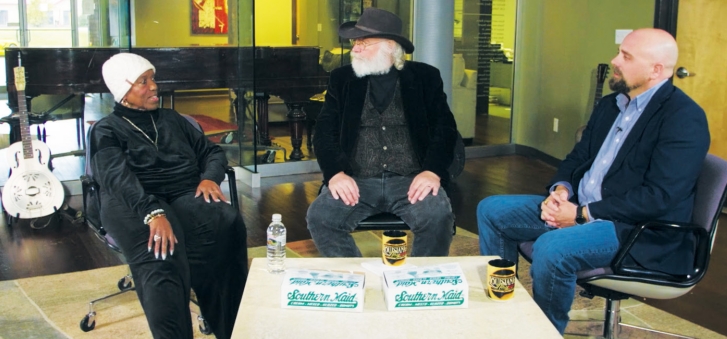Estelle Brown and Elvis

Estelle Brown on the set of “Louisiana Haywire.”
Performer shares stories about her career and thoughts on the King
Writer’s note: Estelle Brown recently sat down with “Louisiana Haywire” to tell her story. This article is drawn from that interview. “Louisiana Haywire” is a new multi-platform program that highlights the rich musical history of Northwest Louisiana through interviews and live performances. You can listen to “Louisiana Haywire” episodes in their entirety live on FM 89.9 (KDAQ) or visit their website, www.redriverradio.org.
Shreveport resident Estelle Brown’s music career has been unpredictable. A simple passion for singing gospel music eventually landed her a role backing one of the biggest rock and roll stars of all time.
Born in Manhattan, Brown got her musical start in school.
“I started singing really in school, in the glee club…never had any idea it would get any further than that, but it did,” she said.
Brown’s first musical contact was with singer Cissy Houston. Her friendship with Cissy Houston led to her relationship with Atlantic Records in New York City.
Brown found herself at a pivotal moment in American music history — the rock and roll and R&B explosion of the 1950s and ’60s.
Soon, Brown and the harmonizing background singers she worked with were in high demand at Atlantic Records. (Outside the studio, she babysat Cissy’s daughter Whitney Houston and helped change her diapers.)
Called The Sweet Inspirations, they backed everyone from Aretha Franklin to Wilson Pickett. Notably, The Sweet Inspirations also provided backing vocals for Van Morrison’s “Brown Eyed Girl,” which was listed by Rolling Stone magazine as No. 110 on the list of 500 Greatest Songs of All Time.

Elvis with Sylvia Shemwell, Estelle Brown and Myrna Smith of The Sweet Inspirations in Las Vegas. February 23, 1973.
In 1968, The Sweet Inspirations scored a Top 40 Hit on the Billboard Pop Charts with their eponymous song “Sweet Inspiration.” It would be their only chart appearance.
“I never thought about making a career out of singing,” Brown said. “I really didn’t. You know what I wanted to be? I wanted to be a teacher.”
In the early 1960s, Brown moved to Los Angeles. Her music career did not wane, as she continued recording sessions with The Sweet Inspirations. However, their career was about to reach unforeseen heights. It started with a call from Tom Diskin, the right-hand man to Elvis’ manager, Colonel Tom Parker.
The Sweet Inspirations had caught the attention of the biggest rock star in the world, Diskin said, and Elvis wanted to hire them.
“The Sweet Inspirations recorded a record called ‘Sweet Inspiration,’ and Elvis heard that record,” Brown said.
Their connection to Elvis happened in part because of a twist of fate.
“The thing was,” Brown said, [Elvis] really didn’t initially want The Sweet Inspirations. He wanted The Blossoms, but The Blossoms were with Tom Jones.”
The Blossoms’ unavailability led to a remarkable eight-year working relationship with Elvis for Brown and other members of The Sweet Inspirations.
“They sent us a whole stack of albums and wanted us to learn Elvis’ music,” Brown said.
The Sweet Inspirations performed alongside Elvis and his famous TCB Band from 1969 to 1977 at the International Hotel in Las Vegas — two six-week runs annually.
Amazingly, they did two shows a night.
In Elvis’ band at that time was future Rock and Roll Hall of Fame member and Louisiana Hayride alumnus James Burton, who Brown described as a good friend.
“It was very important to Elvis that we became family,” she said.
Brown described her first experience backing Elvis and noted the chaos of the experience.
“I couldn’t believe it — all the flashes, all the people who were hollering and screaming and women throwing stuff on the stage.
It was too much. It was just amazing.”
Despite the demands of performance, Elvis always spent time with his band. They would pass the time laughing, talking and joking. (Regarding her encounters with Colonel Tom Parker, Brown described him as “a standoffish guy.”)
Ultimately, Elvis and Brown’s interactions circled back to their shared love of gospel music.
“He loved gospel music,” Brown said.
“In my opinion, if Elvis had still been here, I think Elvis would have ended up being a preacher. Because he loved church and gospel and was very into that.”
Some of Brown’s most memorable moments with the King were in the quiet offstage moments Elvis shared with his bandmates gathered around the piano in his hotel room rather than onstage.
“And we thought we were finished when the two shows were over. No, you had to go with Elvis to his suite and sit up for the rest of the night singing gospel. Can you believe that?”
Her favorite Elvis song is his version of “How Great Thou Art.”
Brown’s proximity to Elvis gave her a glimpse into his world from the periphery of his fame.
“One time, it was a whole flight of people who came from Japan to Vegas to see the Elvis show, and it was at the end of the show, everybody’s going home, I was going home. And how ’bout these people follow me from Vegas to L.A. I couldn’t believe it.”
The Elvis that Brown remembers most is the man behind the fame: a down-to-earth person who loved a good time.
“He was a very decent human being,” Brown said. “What used to grab me all the time was the way he laughed. He would laugh so hard you wouldn’t even know what he was laughing at, but you would start laughing.”
The Sweet Inspirations’ work with Elvis came to a tragic end in 1977. They received word of Elvis’ death while on an airplane to Vegas. The plane turned around and returned to Los Angeles.
“It was very, very hard. In fact, the only way that I was able to really deal with it was, is like, I had to tell myself, ‘You know, everybody has a job. When you have a job, you go to work. When you finish your work, you go home.’ So that’s how I feel about Elvis. He had a job, he did it, and he went home.”
After Elvis’ passing, Brown and The Sweet Inspirations worked briefly with Ricky Nelson, with whom they would collaborate with yet another Shreveport musician, world-famous bassist Joe Osborn.
Brown later worked for an accounting firm but found that the constraint of a nine-to-five job was not for her. Her true passion was making music.
“I enjoyed what I was doing,” Brown said, reflecting on her career.

On the set of “Louisiana Haywire” from left to right, Estelle Brown, Dan Garner and Winston Hall.
Brown has stayed busy as a singer and performer in the years following her Elvis days. Her connection to Elvis still draws attention, and Brown performs occasionally with Elvis tribute artists.
A twist of fate also brought Brown to Shreveport. She had a roommate from Shreveport who was moving home, and having no family in California, Brown decided to move with her.
Looking back, Brown recognized her solid connection to Shreveport through the years because of Elvis’ time on the Louisiana Hayride and her collaborations with Joe Osborn and James Burton. Like other musical legends before her, Brown is happy to call Shreveport home. Although she has earned the right to be called a legend, Brown does not consider herself one. When asked if she considers herself famous, Brown quickly shot down that notion.
“No, I still don’t. I feel like just another human being. I might have had a different job, but I’m still just a human being.”
